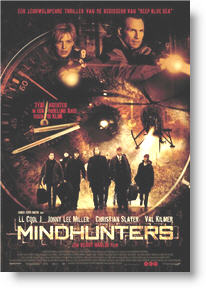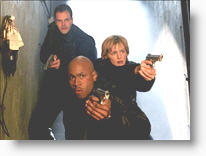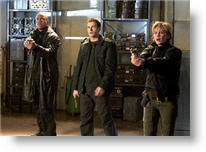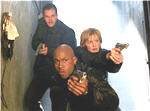Mindhunters
 for violence/strong graphic images, language and sexual content.
for violence/strong graphic images, language and sexual content.
Reviewed by: Dr. Kenneth R. Morefield
CONTRIBUTOR
| Moral Rating: | Extremely Offensive |
| Moviemaking Quality: |
|
| Primary Audience: | Adults |
| Genre: | Crime Action Thriller Psychodrama |
| Length: | 1 hr. 46 min. |
| Year of Release: | 2005 |
| USA Release: |
May 13, 2005 (nationwide) |






| Featuring |
|---|
| Val Kilmer, LL Cool J, Christian Slater, Eion Bailey, Will Kempe, Jonny Lee Miller, Clifton Collins, Kathryn Morris, Patricia Velazquez |
| Director |
|
Renny Harlin |
| Producer |
| Cary Brokaw, Akiva Goldsman, Robert F. Newmyer, Jeffrey Silver |
| Distributor |
 Dimension Films, a division of The Weinstein Company |
“For seven elite profilers, finding a serial killer is a process of elimination. Their own.”
Plot: A group of six F.B.I. trainees and one police observer are sent to a deserted island for a weekend training exercise. As members of the group begin being murdered, the survivors must use their training to discover which of them is trying to kill the others.
In his article “On Moral Equivalence,” political columnist Charles Krauthammer discusses, among other things, the debilitating effect of inflationary, hyperbolic rhetoric. When those participating in public discourse jump at the chance to use superlatives to promote or disparage the marginally above or below average, shades of difference are obliterated, the words they use are robbed of their meaning, and it becomes nearly impossible to differentiate (at least verbally) the mediocre from the truly exceptional or, in the case of “Mindhunters,” the truly awful. In an attempt to avoid the numbing effect of inflationary rhetoric, I probably don’t give out as many A’s or F’s in my reviews as I should. My job, then, in the next 1000-1500 words, is to find new and/or convincing ways of communicating to you just how awful this film was. I can guarantee that if I succeed, I will have demonstrated more creativity and effort than went into the making of this film.
“Mindhunters” was released in overseas markets last year and has been rescheduled for several different release dates in the United States. The practice of pulling a film from a scheduled release is usually a sign that the film is not very good, so I would have bet the rent that the film could not be worse than I anticipated. Good thing gambling is still illegal in my state, or I might be homeless right now.

“Mindhunters” is violent. Director Renny Harlin has some roots in the horror genre (“A Nightmare on Elm Street 4: The Dream Master”), so it isn’t terribly surprising that the violence is less of the action type (guns shooting at people, things exploding) and more of the gruesome type (decapitations, dismemberments, etc.). One character is sprayed with nitrous oxide until his flesh is eaten away and then he is, literally, broken into pieces. Another is pierced with various hooks and hung from the ceiling. One is tricked into inhaling acid that corrodes her body from the inside out. All of this is shown in graphic detail.
We are not merely given a quick cut of the events; Harlin allows the camera to linger lovingly over each death, evidencing the sort of bewildered “why aren’t you praising me?” expectation my cat has when he manages to bring a half eaten rat into the house: “I worked so hard to bring this gift to you, how could you be disgusted at the fruit of my labors!”
I don’t want to give the impression, though, that this violence is the only reason for my disdain for the film. One of my central axioms about horror films or thrillers is that the audience must care about the characters before it can be asked to care about what happens to them—otherwise their bodies are just objects to be beaten, blown-up, and destroyed like any other prop. “Mindhunters” was one of those movies that tries to ratchet up the suspense by keeping the identity of the killer in doubt so that the audience never knows who is in danger.
A not so funny thing happened as a result: as the film moved closer to its conclusion, I realized I really didn’t care who the killer was. Worse yet, I didn’t really care who escaped him—or her—or them. In order to maintain uncertainty about the identity of the killer(s), the film assiduously avoids giving us a protagonist to care about.
Additionally there are at least three instances in which a character is “killed” before our eyes only to reappear later. We are told that these characters are supposed to be members of an elite team of law enforcement professionals, but training for the super-intelligent apparently no longer includes such intellectually rigorous tasks as how to check the body of the person you’ve just shot to see if he is actually dead or how to anagram a 5-6 letter word.
Suffice it to say that none of the survivors from this team are going to win the F.B.I.’s annual Scrabble tournament. Hey, if there are two lethal booby traps on an island, do you think there might be a third? If you answered yes, congratulations, you are smarter than the F.B.I.’s newest class of criminal profilers.
Oh, and the team’s stunning psychological profiling ability allows its members to predict—shockingly—that a nicotine addict might smoke a cigarette sometime during the weekend and that a caffeine junkie just might make a cup of coffee.
I get so tired of movies that tell me how smart their characters are but are unable to portray them doing any smart things because their stupidity is the fuel that keeps the plot engine sputtering along.
The cumulative effect of all this literal and metaphorical idiocy is to rob the actual deaths of any drama or feeling. As we see one person after the other threatened or killed (often in horrific manners), we do not know if we are supposed to feel outraged or saddened, horrified or relieved, because we don’t know for sure whether the person who has just died is really dead and, if he or she is, whether that’s a good thing or a bad thing since we have no way of knowing if whoever died was the actual killer, the killer’s victim, or just mistakenly thought to be the killer by another innocent member of the team trying to protect himself. Consequently we don’t really feel much of anything—except perhaps the occasional bit of empathetic nausea when one of the deaths is particularly gross.
“Mindhunters” wants to pretend it is being postmodernistically ironic about this “who’s really dead?” theme by self-referentially having the profilers repeat early (and often) that a location is secure—the agent and audience are free from the potential of any further plot twists—only “on the drive home.” This line is supposed to make fun of the horror/slasher movie convention that the monster isn’t really dead (think “Anaconda,” “Fatal Attraction,” “Aliens,” etc.), but in the attempt to leave the plot open for more possible twists the movie must avoid at all costs telling us anything definitive about any of these characters, and in doing so it reveals a deep ambivalence towards them.
There is an old joke about “Star Trek” that Captain Kirk, Mr. Spock, and Dr. McCoy would always beam down to an alien planet with an extra in a red shirt who had never been seen before and whose job it was to die in some fashion to prove that the danger to the central characters was real. “Mindhunters” is what you would get if the Enterprise happened onto the lost island of sadistic serial killers and everyone in the landing party was wearing a red shirt.
The film it most reminded me of was—so help me—the 1985 comedy “Clue,” which had a marketing gimmick that there were at least three different endings, each revealing a different character as the killer. Perhaps when the DVD of “Mindhunters” is released we will be subjected to multiple alternate endings which reveal that the character or characters we were glad to see escape were really the killer(s) after all; even after the drive home, we’re probably not safe from the movie changing its mind, because, after all, what difference would it make? Any of the possible endings would be equally possible, however, equally improbable, and each would be equally dramatically powerless because of our indifference to all the characters.
Since I’ve already picked on character non-development and gratuitous violence, I suppose I should spare a part of my diatribe for the film’s inane and incoherent plot. These characters are on a multi-million dollar Navy island base where there is a functional blood typing machine, but no radio or telephone? To catalog all the plot holes here would be to treat Mindhunters as an exercise in plausibility, which is more than it deserves, so I’ll pick only the most egregious plot crater as a means of exemplifying that the film’s contempt for the audience is so deep that it doesn’t even bother to try to come up with plausible explanations for its situations.
Late in the film, the surviving characters find a hidden room with three people who had been watching them on close circuit television. When, exactly, these characters were killed by the murderer(s) remains a mystery as does how he, she, or they were able to surprise and kill all three people in that room when the victims presumably had the benefit of surveillance cameras that could see everything that was happening on the island, including the killer or killers approaching their room. Were the people in the room originally teamed up with the killer(s)? If not, they must have been killed before the first victim on the team, but that victim died before everyone gets drugged and knocked out long enough for the killer to set all the other booby traps, so when did the killer(s) set this elaborate booby trap and kill the supervisors who would have to have seen him/them set it up? For that matter, how did the killer(s) even know that those three surveillance people were in the room to be killed, much less where the room was? How did the killer know every other member of the team was going to drink the drugged coffee? I know, I know, I’m supposed to suspend disbelief, but what if the only way to suspend it far enough is to give myself a lobotomy?
Of all the rip offs that “Mindhunters” makes from other works in the serial killer genre, none was more cynical than its title. “Mindhunter” was the title of the first autobiographical book by John Douglas, in which he details how he merged his education in psychology with his career as an F.B.I. field agent and basically created the practice of psychologically profiling serial killers. In it, Douglas also poignantly describes the psychological toll of a life spent surrounded by the sort of violence that to most of us is, thankfully, unimaginable. I heard a sermon on the ten commandments once that suggested that to the ancient Hebrews taking God’s name “in vain” meant more than just swearing—it also included appropriating the name of God and attaching it to that which was antithetical to His nature and character. “Mindhunters” takes its title in vain, and while I would in no way suggest that this is an offense of Biblical proportions, I wouldn’t hesitate to suggest that its true name ought to be “Mindkillers,” because the longer it went on the dumber everyone in the movie acted and the dumber I felt for sitting through it.
My Grade: F-
Violence: Extreme / Profanity: Moderate / Sex/nudity: Moderate


My Ratings: Very Offensive / 5